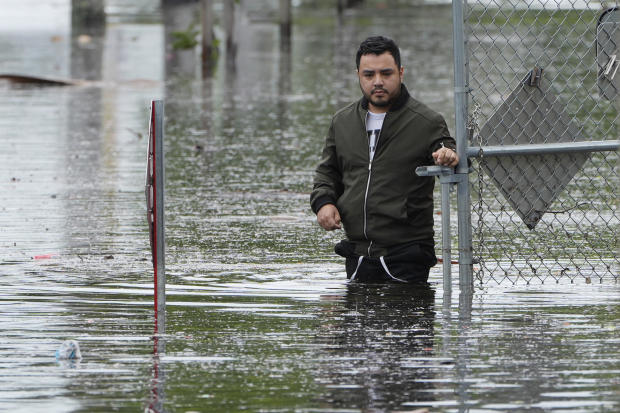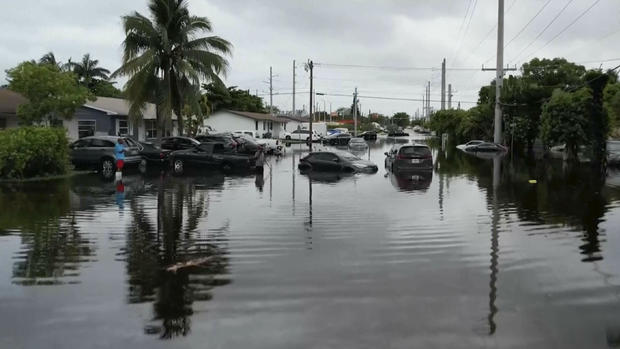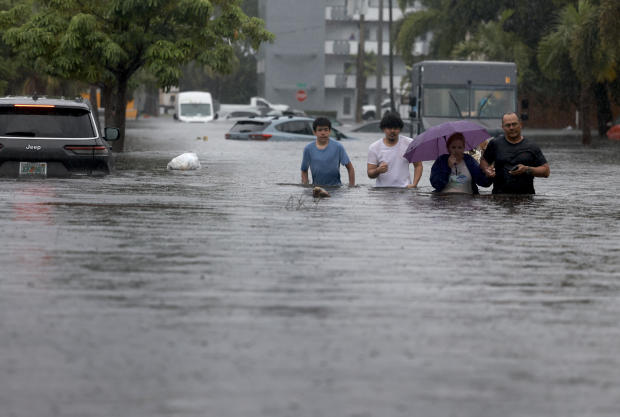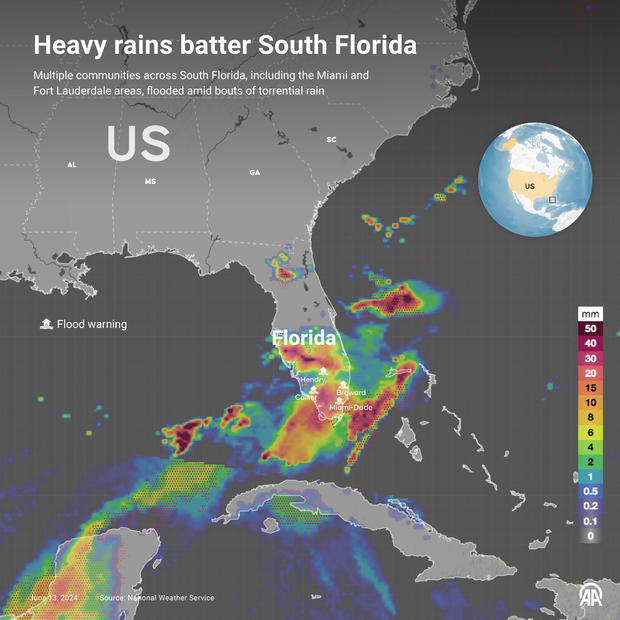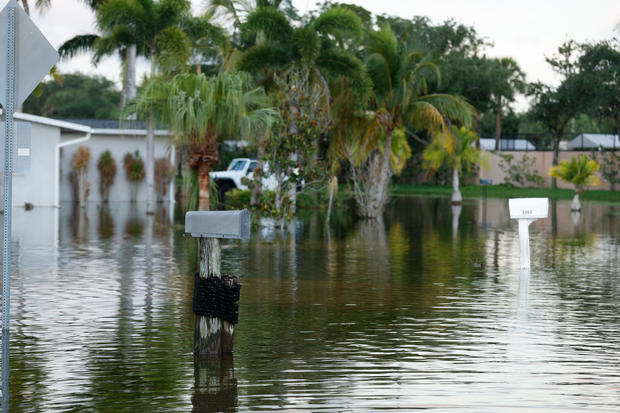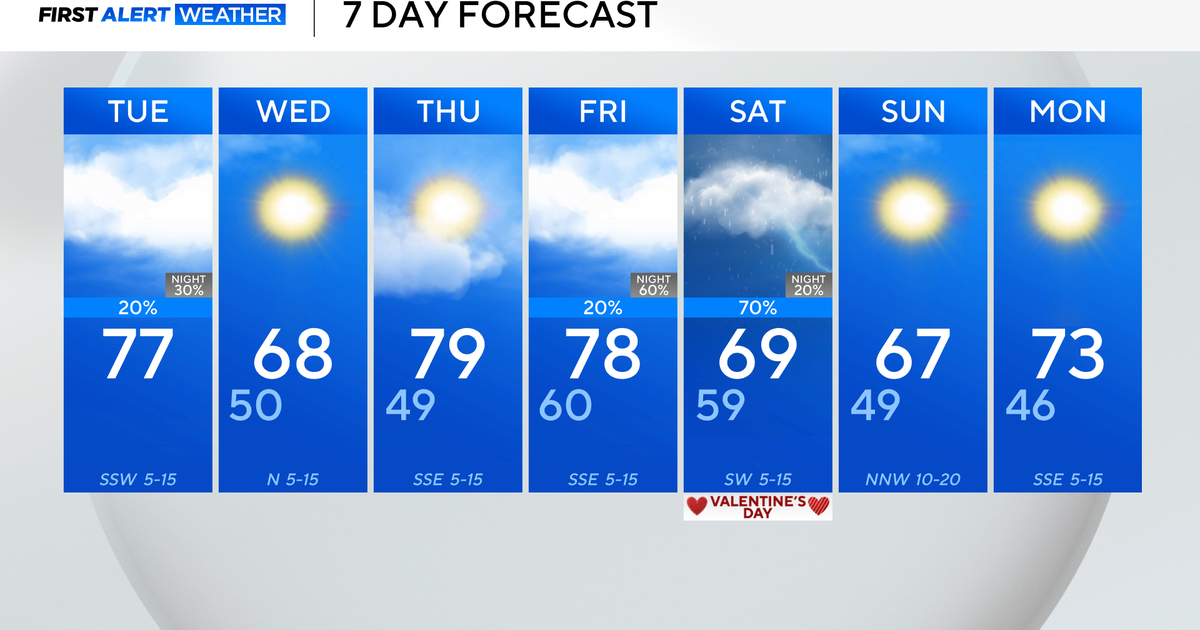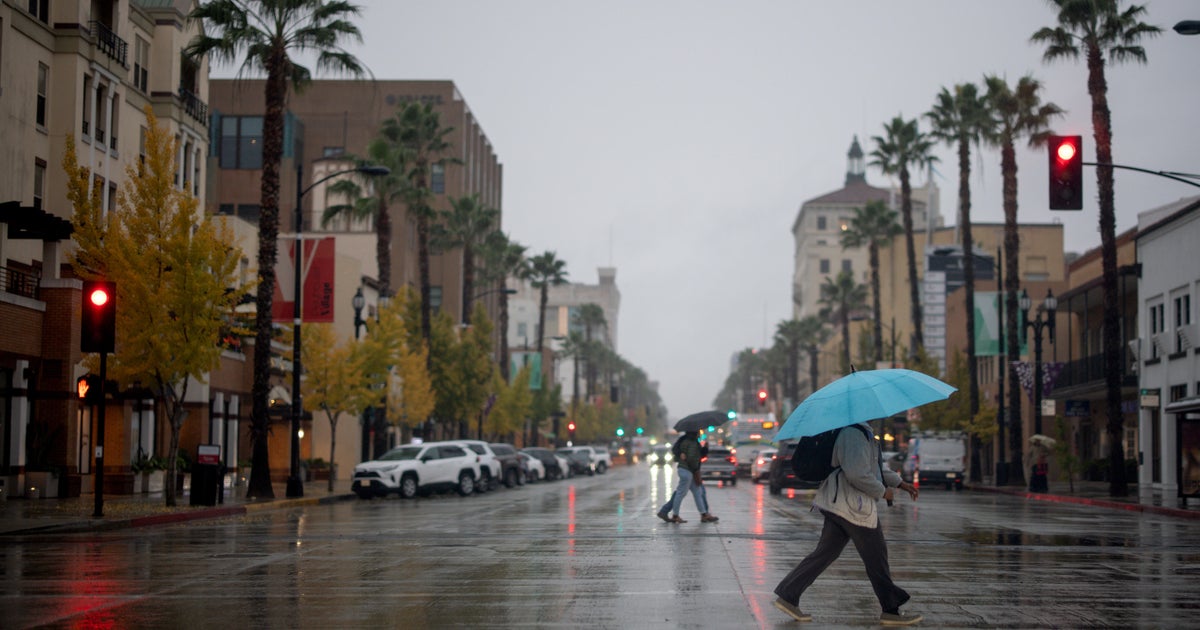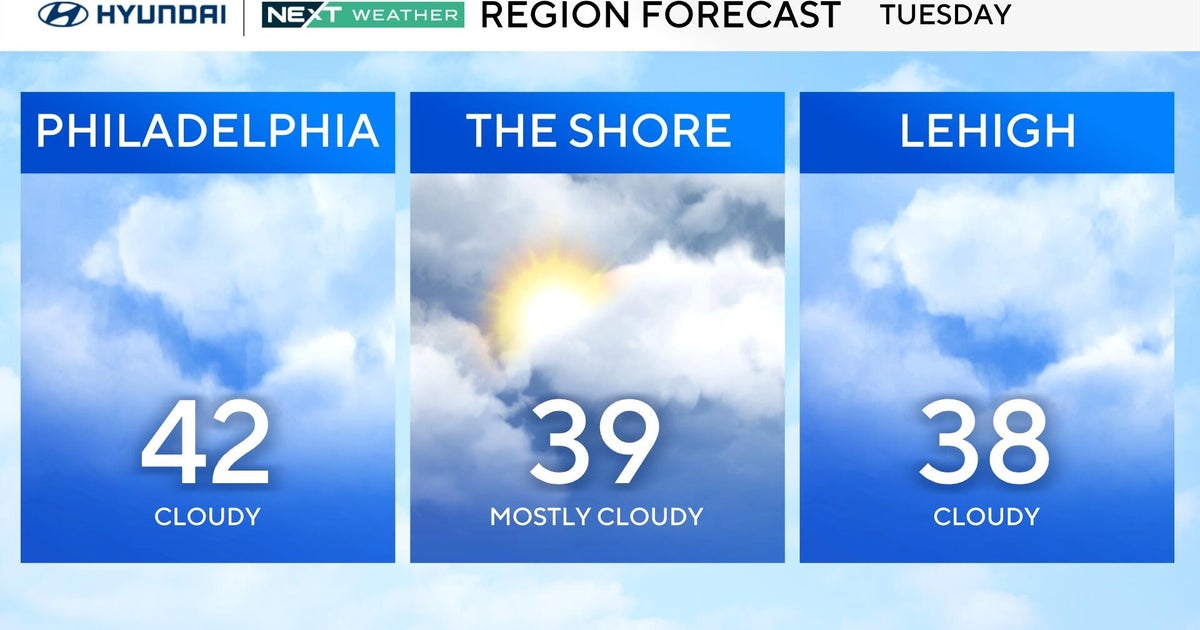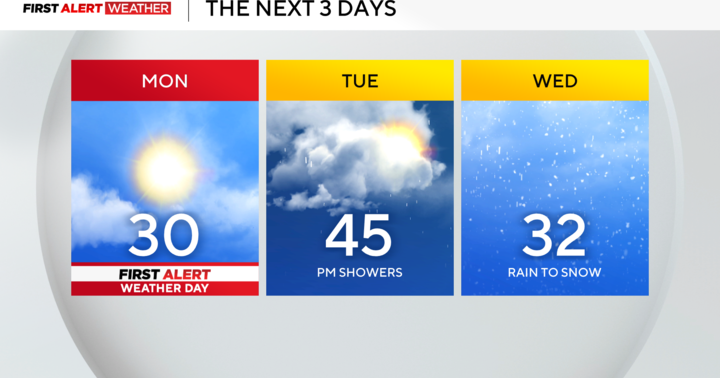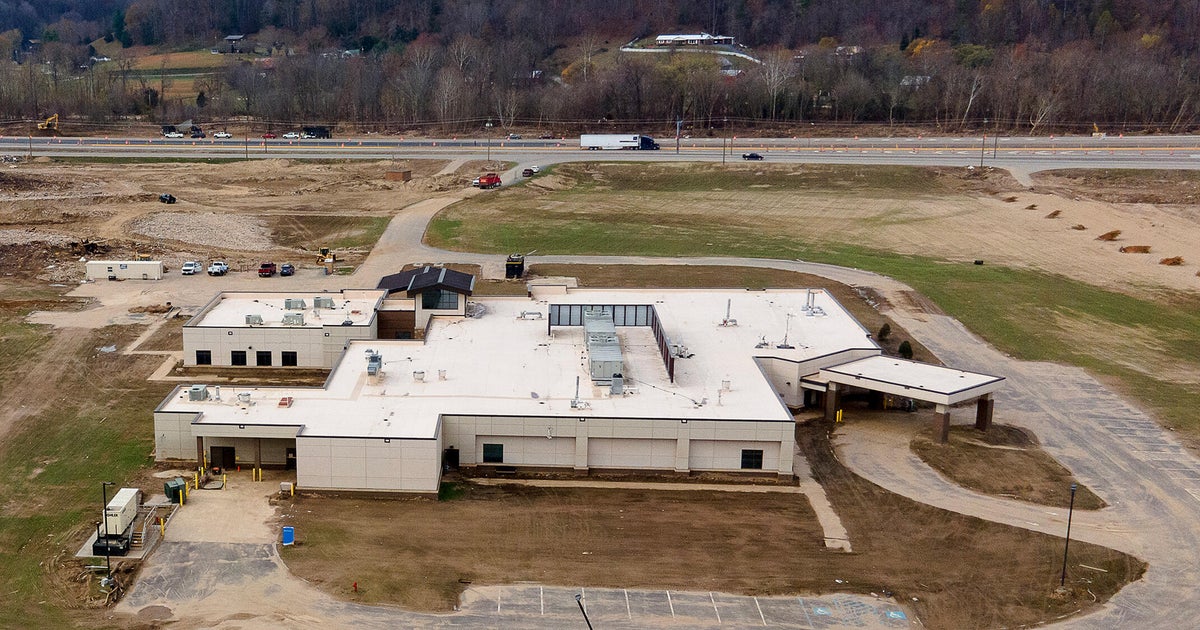Maps and photos show massive rainfall in Florida as flooded communities face ongoing downpours
A relentless string of powerful storms soaked much of South Florida this week and Friday's forecast predicted more rain will continue to soak sections of the state. Florida Gov. Ron DeSantis declared a state of emergency for Broward, Collier, Lee, Miami-Dade, and Sarasota counties.
The National Weather Service warned that even smaller amounts of precipitation could worsen saturated areas, triggering more flash floods on Friday. Patients and workers at a cancer hospital in Fort Myers were stranded Thursday afternoon because of flooding, CBS affiliate WINK-TV reported.
Images emerged of children traversing South Florida streets in an inflatable raft, adults wading through knee-deep water covering neighborhood blocks, and cars stalled while submerged and stranded in the middle of roadways. Meteorologists warned that an additional 2 to 4 inches of rain were forecast for Friday with higher amounts possible in some areas.
Officials said around 20 inches had fallen on Thursday afternoon in Hallandale Beach, near Fort Lauderdale. Videos from the Broward County community showed cars submerged to the hood. All Broward County schools were closed Thursday, and will remain closed Friday.
Parts of South Florida were under flood watches on Friday, with forecasters projecting additional rain falling on saturated ground for counties previously hit by earlier deluges in the last few days.
What communities in Florida will be impacted?
A tropical disturbance triggered a rare flash flood emergency warning across the tip of the Florida peninsula Thursday. Parts of South Florida were hit by heavy rains and flooding earlier in the week.
Meteorologists at the National Weather Service updated their risk profile for excessive rainfall in Florida's southernmost areas to "moderate" early Friday morning, explaining in a bulletin that "even moderate rain rates are likely to cause additional flash flooding, as any rainfall will be unable to drain anywhere, and will instead pond in place."
Florida wildlife officials have said that alligators and other wildlife could become more visible in flooded neighborhoods after a hurricane or tropical storm. It was not immediately clear whether current flooding would bring them out in the same way.
In addition to the governor's emergency declaration, Miami-Dade Mayor Daniella Levine Cava, Miami Mayor Francis Suarez and Fort Lauderdale Mayor Dean Trantalis individually issued emergency declarations for their jurisdictions in response to torrential rain and flooding.
Those declarations trigger a set of emergency management protocols that allow authorities, either at the local or state level or both, to access funds and other resources to respond to the weather. With the declaration in Miami, the city also set up distribution sites for sandbags, for residents to place outside the doors and windows of their homes to block out water, and opened nine public parking garages for people in flood-prone areas to leave their cars.
Another state of emergency was declared for the cities of Dania Beach and Sunny Isles Beach, as police and fire crews said they had conducted at least 40 rescues in Dania Beach in the midst of Wednesday's storms, CBS News Miami reported. Photos and video out of Dania Beach showed streets completely flooded, with water levels in some instances as high as a car tire.
Many of those cities and counties braced for ongoing storms, and a flood watch was in effect for parts of Miami-Dade and Broward counties through Friday evening.
How much rain is Florida forecast to get?
Storms have already dumped massive amounts of rain on much of southern Florida, with the latest precipitation reports indicating over 20 inches fell in parts of Miami-Dade and Broward counties. These totals were just shy of the record rainfall total recorded in the state over the last three days, which surpassed 2 feet of rain in the Everglades. Along the Gulf Coast, reports show at least 6 or 7 inches fell in several counties this week, and as much as 10 or 11 inches fell in several of them.
This week's rainfall set new records in a handful of places, including some as far north as Fort Myers and the Winter Haven Regional Airport, which is about halfway between Tampa Bay and Orlando, according to the weather service. In Fort Myers, the city's latest rainfall of 5.44 inches in 24 hours eclipsed the 3.86 inches recorded earlier in the week, which surpassed its 2008 record-high of 2.14 inches. Precipitation records for Fort Myers date back more than a century.
Meteorologists said that parts of coastal Sarasota County, which sits just below Tampa Bay, felt the brunt of the Gulf Coast weather on Wednesday, with 6 to 10 inches of rain recorded in various spots. One rainfall report showed almost 11.4 inches at a location in Sarasota.
Despite the significant rainfall that already hit western Florida and the additional totals expected, forecasters said widespread flooding probably would not materialize, since precipitation would be coming in spurts and the breaks in between allowing water to drain. The primary concern was localized flooding and, potentially, flooding in urban areas. "Heavy rainfall is forecast now through the weekend. At times, this could lead to mainly minor nuisance flooding in low-lying and poor drainage areas," NWS Tampa Bay said Tuesday in a social media post.
The agency advised drivers in the area to avoid flooded roads — according to National Weather Service data, almost half of all flood-related deaths in the United States each year involve vehicles.
Although the Florida counties farthest south on the peninsula were expected to see the most damaging rainfall Friday, meteorologists also warned that the proximity of certain places nearer the Gulf Coast could still face substantial threats of more heavy rain and flooding, especially in areas where the ground is already saturated from earlier storms.
Alex Sundby contributed reporting.
